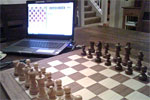


ChessBase 17 - Mega package - Edition 2024
It is the program of choice for anyone who loves the game and wants to know more about it. Start your personal success story with ChessBase and enjoy the game even more.
This tournament is being held from September 28th to October 5th 2008 in the Beijing Golden Century Golf Club, Fangshan, Beijing, China. It is part of the Computer Games Championship, with 28 different games like chess, draughts, checkers, Go, backgammon, etc. All participants are computer programs. The purpose is to find the strongest programs at each of the games, partly as an academic exercise and partly because the competitions are fun.
The entry fees for the World Computer Chess championship are € 25 for amateurs, € 250 for semi-professionals and € 500 for professionals. "Amateur": programmers who have no commercial interest in their program, and are not professional game programmers. "Semi-professional" is the term defining any program submitted by an employee or associate from a games-programming company. The program's name must not be derived from or similar to a commercial product. "Professional": A program whose name is the same as or derived from a commercial product.
Each entry is a computing system and one or more humans who programmed it. At least one of the program developers should attend the Championship to operate the program, otherwise the entry fee for the program is doubled. Each program must be the original work of the entering developers. Programming teams whose code is derived from or including game-playing code written by others must name all other authors, or the source of such code, in their submission details.
Here are the exact rules of the 13th Computer Games Championship.
Eight of the ten participants of the WCCC are using remote machines in Europe. They are connected via slow but relatively stable Internet connections (while the local network seems to be a minor catastrophe). After five rounds of play the cross table is as follows:

The leading programs Rybka and Hiarcs have conceded only a single draw, both against the same program, Cluster Toga, which has scored 50%. The Israeli program Junior has two draws, one against Shredder and one against a program called Falcon. Shredder has suffered a loss (to Rybka) and drawn all its other games. Mobile Chess, which has lost all its games, is a Java ME program running on a Nokia 6120c cell phone.
Here is the hardware being used by the participants:
| Program | Country | Hardware |
| Rybka | USA | Cluster, 40 cores 3.5 4 5.0 4.50 |
| Hiarcs | GBR | Intel Skulltrail, 8 x 4Ghz 3.5 4 3.0 2.50 |
| Sjeng | BEL | Intel Core 2, 4 x 2.8Ghz 2.5 4 4.0 2.00 |
| Junior | ISR | Intel Dunnington, 12 x 2.67Ghz 2.5 3 3.0 2.50 |
| The Baron | NLD | AMD Opteron 270, 4 x 2Ghz 2.0 4 7.0 1.75 |
| Jonny | GER | Cluster, 16 cores 1.0 4 12.0 2.50 |
| Cluster Toga | GER | 24 cores 1.0 3 9.5 3.50 |
| Shredder | GER | Intel Core 2, 8 x 3.16Ghz 1.0 3 8.0 2.25 |
| Falcon | ISR | Intel Core 2, 2 x 2.1Ghz 1.0 3 6.0 0.00 |
| Mobile Chess | CHN | Nokia 6120c 0.0 4 9.0 0.00 |
Hans van der Zijden, the operator of Rybka, tells us that an exhibition match was arranged between a top Chinese women grandmaster Gu Xiao Bing and the current computer chess world champion Rybka. Gu was startled when she heard who her opponent was and said, "Ribbéca, I always lose". And lose she did, 0-2, but her first game wasn't bad. Hans also reports that in its game against Shredder the program made an astonishing prediction:
Rybka - Shredder
16th World Computer Chess Championship Beijing, China (2), 29.09.2008
1.e4 c5 2.Nc3 d6 3.Nge2 Nf6 4.d4 cxd4 5.Nxd4 a6 6.h3 e6 7.g4 d5 8.exd5
Nxd5 9.Bd2 Nc6 10.Nxc6 bxc6 11.Bg2 Be7 12.0-0 a5 13.Ne2 h5 14.gxh5 Bf6 15.c4
Ne7 16.Nc3 Ra6 17.Qe2 Nf5 18.Rad1 Nd4 19.Qd3 Nf5 20.Qxd8+ Bxd8 21.h6 Nxh6 22.Na4
Be7 23.Be3 Nf5 24.Bb6 Kf8 25.Rfe1 f6 26.Bxc6 Rxh3 27.c5 Kf7 28.Be4 Rh4 29.Nc3
Rg4+ 30.Kf1 Rf4 31.Rd3 Rxb6 32.cxb6 Ba6 33.b7 Bd6 34.a4 Rxe4 35.Nxe4 Bxd3+ 36.Kg1
Bxe4 37.Rxe4 Ke7 38.Rc4 Kd7 39.Rc8 Nd4 40.b8Q Bxb8 41.Rxb8 Kd6 42.Kg2 g5 43.Rg8
Kc5 44.Rg6 f5 45.Rxg5 Kb4 46.Rg8 Kxa4 47.Rb8 Nc2 48.f4 Nb4 49.Kf3 Kb3 50.Rb5
Kxb2 51.Ke3 Kc1 52.Rxa5 Kd1 53.Rb5

Here Rybka suddenly announced mate in 1942 moves! That turned out to be a display problem – probably Rybka was signalling that it was mate in 2000 (it's mate score) minus 1942 = 29 moves. It went on to dutifully win the position with 53...Nd5+ 54.Kf3 Kd2 55.Rb8 Kd3 56.Rd8 Kd4 57.Re8 Ne3 58.Rxe6 Nc4 59.Kg3 Kd5 60.Re8 Kd6 61.Kh4 Kd7 62.Re1 Nd6 63.Kg5 Kc6 64.Re6 Kb7 65.Rxd6 Kc8 66.Kxf5 Kc7 1-0.
Another cautionary tale narrated by Hans van der Zijden involves a blitz tournament staged for the programs. This was not an easy matter, given the poor Internet and local network stability. Hans experimented with different setting for Rybka, giving it two minutes for the entire game, or three minutes for 100 moves. He also had to restart and switch engines. In Rybka's game against the program Falcon the latter was happy to get a draw. But then it was discovered that it was not Rybka but Fritz 5.32 that was playing (this engine is delivered as part of the ChessBase Rybka package). He had inadvertently switched to the wrong engine, and Rybka was actually forfeited the game.